Coursework 2: Issues in Global Business and McDonald's Strategy
VerifiedAdded on 2019/12/03
|18
|5411
|151
Report
AI Summary
This report provides a comprehensive analysis of McDonald's international strategy, examining the factors influencing its global expansion. It begins with an introduction highlighting the importance of strategic planning in international markets, using McDonald's as a case study. The report then delves into the factors to consider when selecting an international strategy, using PESTEL analysis to assess political, economic, social, technological, environmental, and legal factors. The application of the Uppsala model of internationalization is also discussed, outlining the stages of market entry. Furthermore, the report explores various strategic options for international expansion, including indirect exporting and franchising, and addresses the issues involved in choosing these options. The report concludes by summarizing McDonald's strategic choices and their implications for global operations. The report also analyzes the strategic options used by McDonald's for international operations. The report makes use of the PESTEL analysis and the Uppsala model of internationalization.
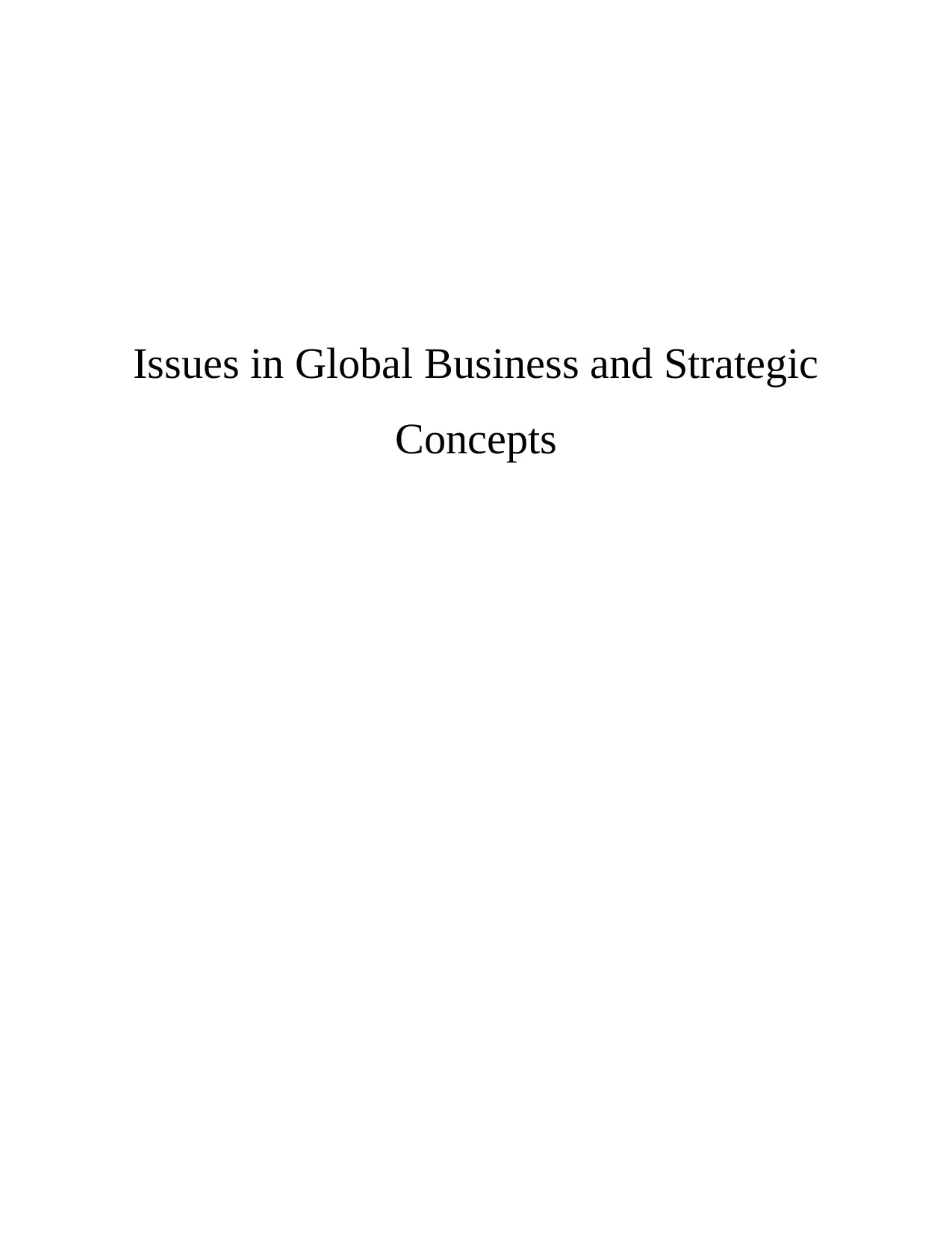
Issues in Global Business and Strategic
Concepts
Concepts
Paraphrase This Document
Need a fresh take? Get an instant paraphrase of this document with our AI Paraphraser
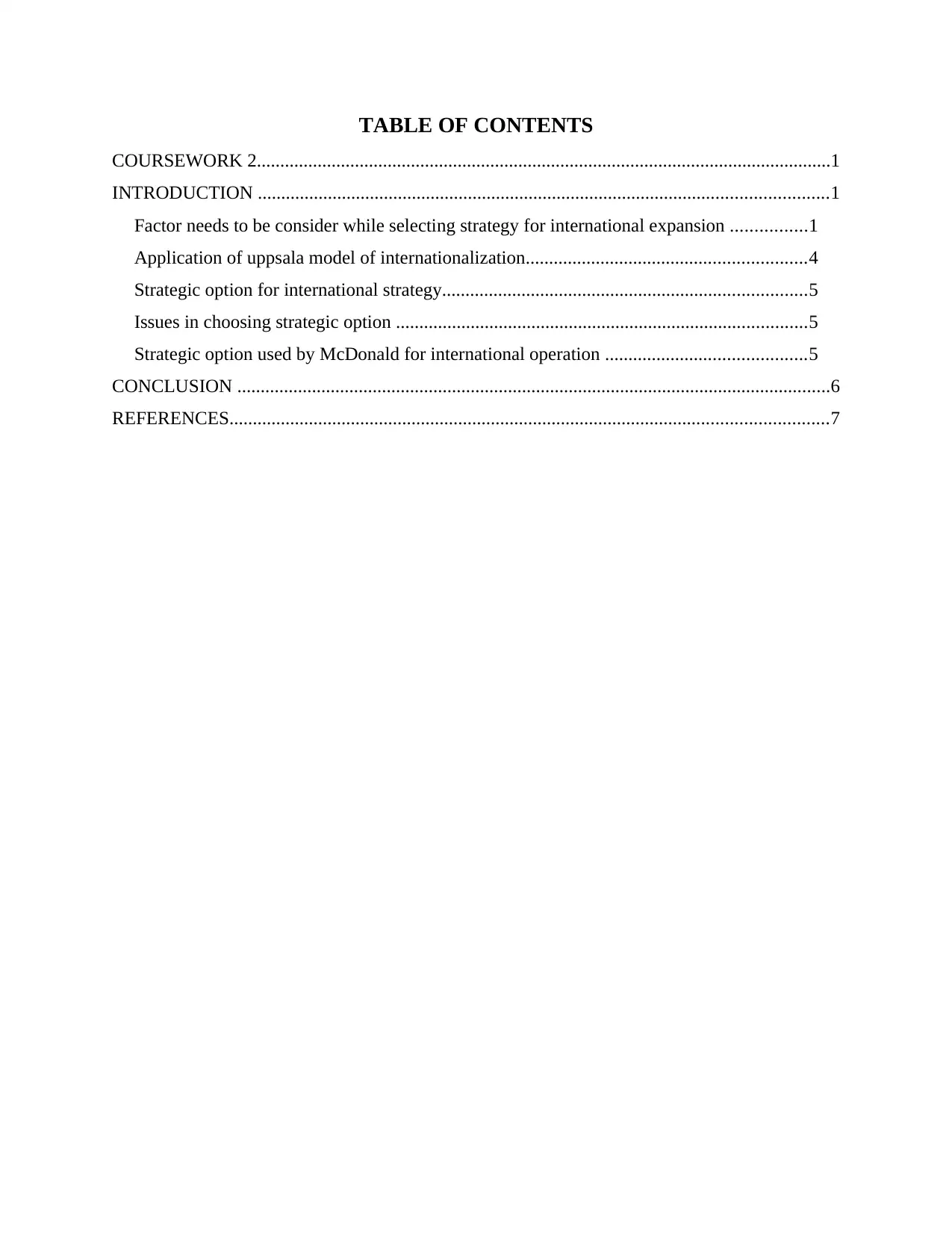
TABLE OF CONTENTS
COURSEWORK 2...........................................................................................................................1
INTRODUCTION ..........................................................................................................................1
Factor needs to be consider while selecting strategy for international expansion ................1
Application of uppsala model of internationalization............................................................4
Strategic option for international strategy..............................................................................5
Issues in choosing strategic option ........................................................................................5
Strategic option used by McDonald for international operation ...........................................5
CONCLUSION ...............................................................................................................................6
REFERENCES................................................................................................................................7
COURSEWORK 2...........................................................................................................................1
INTRODUCTION ..........................................................................................................................1
Factor needs to be consider while selecting strategy for international expansion ................1
Application of uppsala model of internationalization............................................................4
Strategic option for international strategy..............................................................................5
Issues in choosing strategic option ........................................................................................5
Strategic option used by McDonald for international operation ...........................................5
CONCLUSION ...............................................................................................................................6
REFERENCES................................................................................................................................7
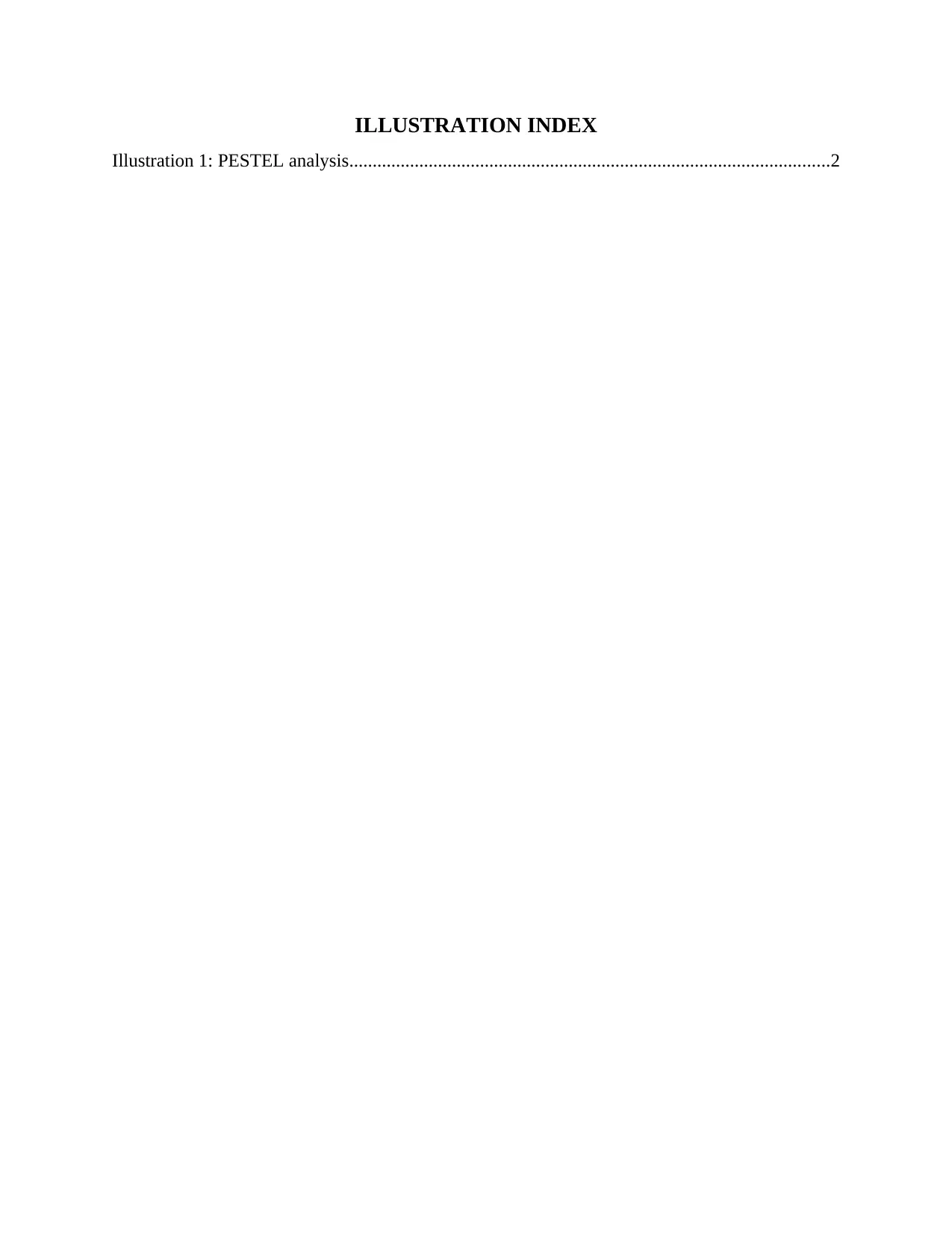
ILLUSTRATION INDEX
Illustration 1: PESTEL analysis.......................................................................................................2
Illustration 1: PESTEL analysis.......................................................................................................2
⊘ This is a preview!⊘
Do you want full access?
Subscribe today to unlock all pages.

Trusted by 1+ million students worldwide
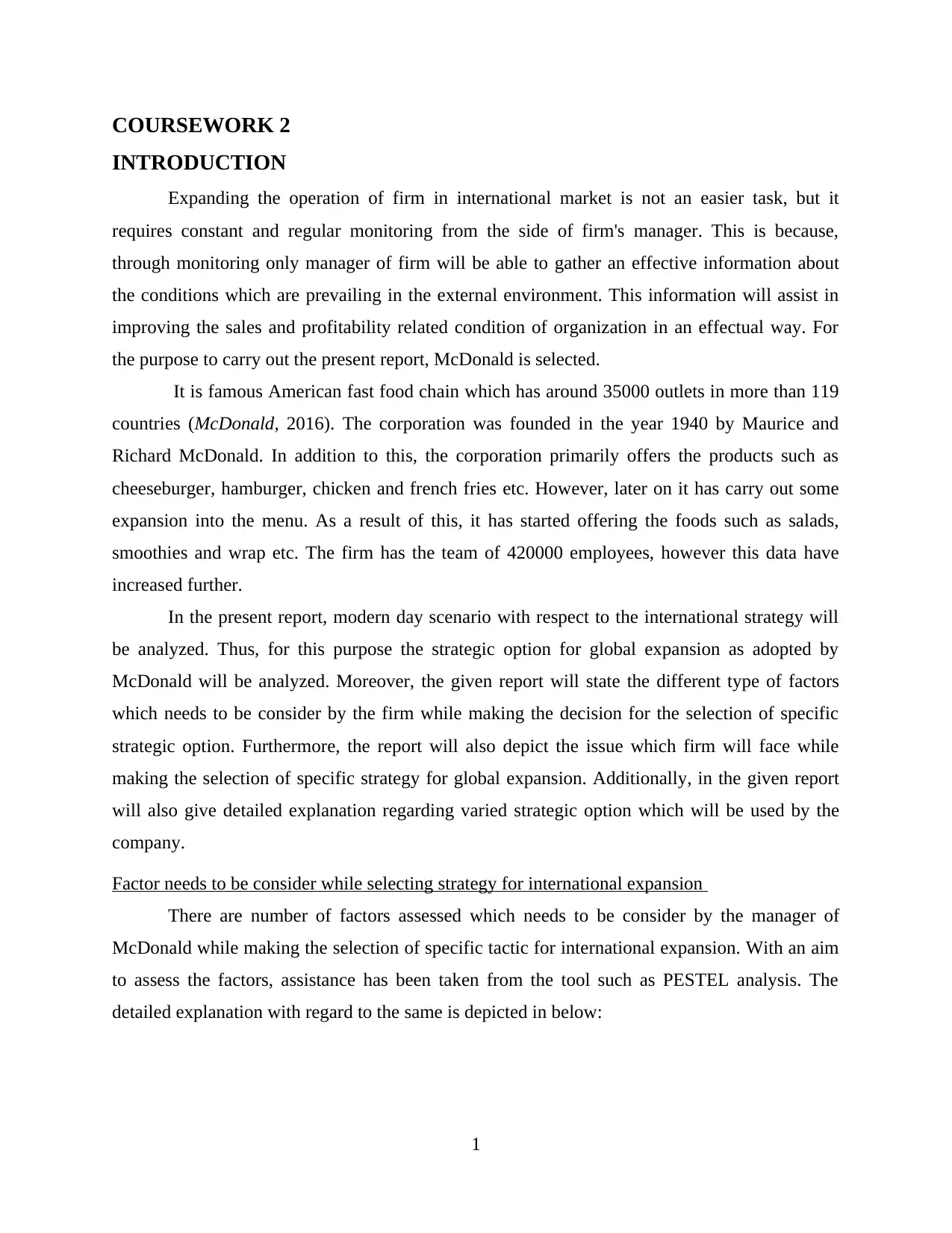
COURSEWORK 2
INTRODUCTION
Expanding the operation of firm in international market is not an easier task, but it
requires constant and regular monitoring from the side of firm's manager. This is because,
through monitoring only manager of firm will be able to gather an effective information about
the conditions which are prevailing in the external environment. This information will assist in
improving the sales and profitability related condition of organization in an effectual way. For
the purpose to carry out the present report, McDonald is selected.
It is famous American fast food chain which has around 35000 outlets in more than 119
countries (McDonald, 2016). The corporation was founded in the year 1940 by Maurice and
Richard McDonald. In addition to this, the corporation primarily offers the products such as
cheeseburger, hamburger, chicken and french fries etc. However, later on it has carry out some
expansion into the menu. As a result of this, it has started offering the foods such as salads,
smoothies and wrap etc. The firm has the team of 420000 employees, however this data have
increased further.
In the present report, modern day scenario with respect to the international strategy will
be analyzed. Thus, for this purpose the strategic option for global expansion as adopted by
McDonald will be analyzed. Moreover, the given report will state the different type of factors
which needs to be consider by the firm while making the decision for the selection of specific
strategic option. Furthermore, the report will also depict the issue which firm will face while
making the selection of specific strategy for global expansion. Additionally, in the given report
will also give detailed explanation regarding varied strategic option which will be used by the
company.
Factor needs to be consider while selecting strategy for international expansion
There are number of factors assessed which needs to be consider by the manager of
McDonald while making the selection of specific tactic for international expansion. With an aim
to assess the factors, assistance has been taken from the tool such as PESTEL analysis. The
detailed explanation with regard to the same is depicted in below:
1
INTRODUCTION
Expanding the operation of firm in international market is not an easier task, but it
requires constant and regular monitoring from the side of firm's manager. This is because,
through monitoring only manager of firm will be able to gather an effective information about
the conditions which are prevailing in the external environment. This information will assist in
improving the sales and profitability related condition of organization in an effectual way. For
the purpose to carry out the present report, McDonald is selected.
It is famous American fast food chain which has around 35000 outlets in more than 119
countries (McDonald, 2016). The corporation was founded in the year 1940 by Maurice and
Richard McDonald. In addition to this, the corporation primarily offers the products such as
cheeseburger, hamburger, chicken and french fries etc. However, later on it has carry out some
expansion into the menu. As a result of this, it has started offering the foods such as salads,
smoothies and wrap etc. The firm has the team of 420000 employees, however this data have
increased further.
In the present report, modern day scenario with respect to the international strategy will
be analyzed. Thus, for this purpose the strategic option for global expansion as adopted by
McDonald will be analyzed. Moreover, the given report will state the different type of factors
which needs to be consider by the firm while making the decision for the selection of specific
strategic option. Furthermore, the report will also depict the issue which firm will face while
making the selection of specific strategy for global expansion. Additionally, in the given report
will also give detailed explanation regarding varied strategic option which will be used by the
company.
Factor needs to be consider while selecting strategy for international expansion
There are number of factors assessed which needs to be consider by the manager of
McDonald while making the selection of specific tactic for international expansion. With an aim
to assess the factors, assistance has been taken from the tool such as PESTEL analysis. The
detailed explanation with regard to the same is depicted in below:
1
Paraphrase This Document
Need a fresh take? Get an instant paraphrase of this document with our AI Paraphraser
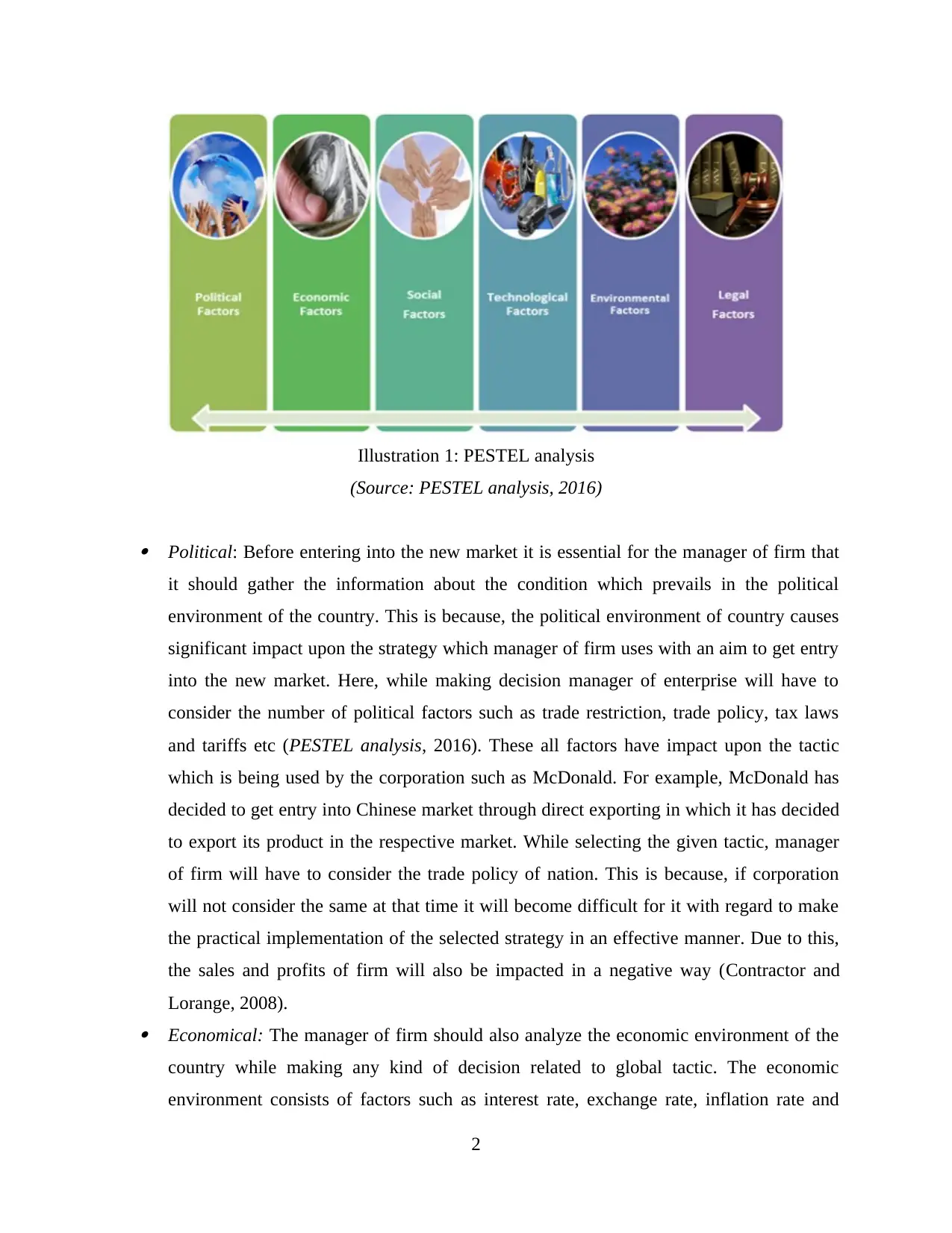
Political: Before entering into the new market it is essential for the manager of firm that
it should gather the information about the condition which prevails in the political
environment of the country. This is because, the political environment of country causes
significant impact upon the strategy which manager of firm uses with an aim to get entry
into the new market. Here, while making decision manager of enterprise will have to
consider the number of political factors such as trade restriction, trade policy, tax laws
and tariffs etc (PESTEL analysis, 2016). These all factors have impact upon the tactic
which is being used by the corporation such as McDonald. For example, McDonald has
decided to get entry into Chinese market through direct exporting in which it has decided
to export its product in the respective market. While selecting the given tactic, manager
of firm will have to consider the trade policy of nation. This is because, if corporation
will not consider the same at that time it will become difficult for it with regard to make
the practical implementation of the selected strategy in an effective manner. Due to this,
the sales and profits of firm will also be impacted in a negative way (Contractor and
Lorange, 2008). Economical: The manager of firm should also analyze the economic environment of the
country while making any kind of decision related to global tactic. The economic
environment consists of factors such as interest rate, exchange rate, inflation rate and
2
Illustration 1: PESTEL analysis
(Source: PESTEL analysis, 2016)
it should gather the information about the condition which prevails in the political
environment of the country. This is because, the political environment of country causes
significant impact upon the strategy which manager of firm uses with an aim to get entry
into the new market. Here, while making decision manager of enterprise will have to
consider the number of political factors such as trade restriction, trade policy, tax laws
and tariffs etc (PESTEL analysis, 2016). These all factors have impact upon the tactic
which is being used by the corporation such as McDonald. For example, McDonald has
decided to get entry into Chinese market through direct exporting in which it has decided
to export its product in the respective market. While selecting the given tactic, manager
of firm will have to consider the trade policy of nation. This is because, if corporation
will not consider the same at that time it will become difficult for it with regard to make
the practical implementation of the selected strategy in an effective manner. Due to this,
the sales and profits of firm will also be impacted in a negative way (Contractor and
Lorange, 2008). Economical: The manager of firm should also analyze the economic environment of the
country while making any kind of decision related to global tactic. The economic
environment consists of factors such as interest rate, exchange rate, inflation rate and
2
Illustration 1: PESTEL analysis
(Source: PESTEL analysis, 2016)
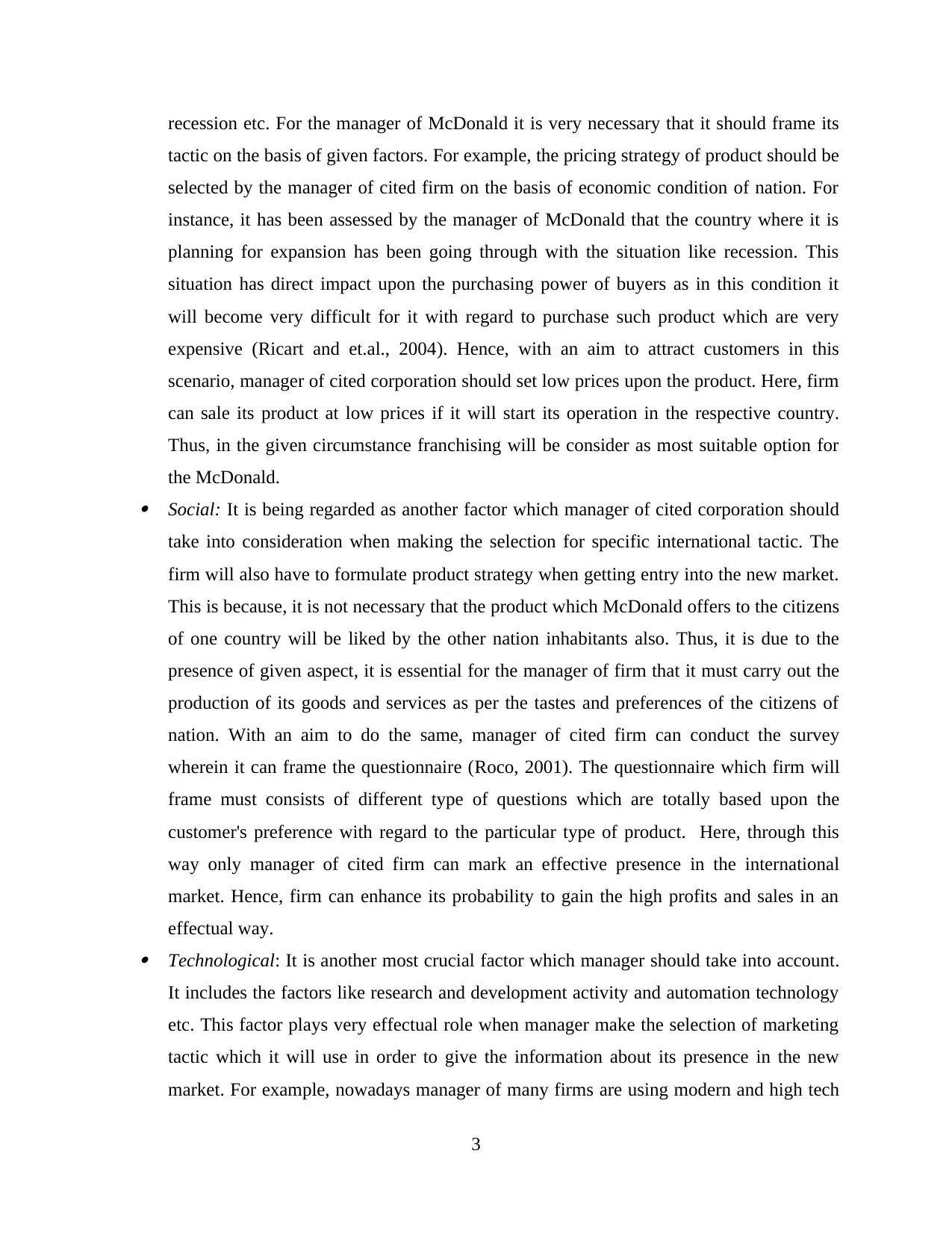
recession etc. For the manager of McDonald it is very necessary that it should frame its
tactic on the basis of given factors. For example, the pricing strategy of product should be
selected by the manager of cited firm on the basis of economic condition of nation. For
instance, it has been assessed by the manager of McDonald that the country where it is
planning for expansion has been going through with the situation like recession. This
situation has direct impact upon the purchasing power of buyers as in this condition it
will become very difficult for it with regard to purchase such product which are very
expensive (Ricart and et.al., 2004). Hence, with an aim to attract customers in this
scenario, manager of cited corporation should set low prices upon the product. Here, firm
can sale its product at low prices if it will start its operation in the respective country.
Thus, in the given circumstance franchising will be consider as most suitable option for
the McDonald. Social: It is being regarded as another factor which manager of cited corporation should
take into consideration when making the selection for specific international tactic. The
firm will also have to formulate product strategy when getting entry into the new market.
This is because, it is not necessary that the product which McDonald offers to the citizens
of one country will be liked by the other nation inhabitants also. Thus, it is due to the
presence of given aspect, it is essential for the manager of firm that it must carry out the
production of its goods and services as per the tastes and preferences of the citizens of
nation. With an aim to do the same, manager of cited firm can conduct the survey
wherein it can frame the questionnaire (Roco, 2001). The questionnaire which firm will
frame must consists of different type of questions which are totally based upon the
customer's preference with regard to the particular type of product. Here, through this
way only manager of cited firm can mark an effective presence in the international
market. Hence, firm can enhance its probability to gain the high profits and sales in an
effectual way. Technological: It is another most crucial factor which manager should take into account.
It includes the factors like research and development activity and automation technology
etc. This factor plays very effectual role when manager make the selection of marketing
tactic which it will use in order to give the information about its presence in the new
market. For example, nowadays manager of many firms are using modern and high tech
3
tactic on the basis of given factors. For example, the pricing strategy of product should be
selected by the manager of cited firm on the basis of economic condition of nation. For
instance, it has been assessed by the manager of McDonald that the country where it is
planning for expansion has been going through with the situation like recession. This
situation has direct impact upon the purchasing power of buyers as in this condition it
will become very difficult for it with regard to purchase such product which are very
expensive (Ricart and et.al., 2004). Hence, with an aim to attract customers in this
scenario, manager of cited corporation should set low prices upon the product. Here, firm
can sale its product at low prices if it will start its operation in the respective country.
Thus, in the given circumstance franchising will be consider as most suitable option for
the McDonald. Social: It is being regarded as another factor which manager of cited corporation should
take into consideration when making the selection for specific international tactic. The
firm will also have to formulate product strategy when getting entry into the new market.
This is because, it is not necessary that the product which McDonald offers to the citizens
of one country will be liked by the other nation inhabitants also. Thus, it is due to the
presence of given aspect, it is essential for the manager of firm that it must carry out the
production of its goods and services as per the tastes and preferences of the citizens of
nation. With an aim to do the same, manager of cited firm can conduct the survey
wherein it can frame the questionnaire (Roco, 2001). The questionnaire which firm will
frame must consists of different type of questions which are totally based upon the
customer's preference with regard to the particular type of product. Here, through this
way only manager of cited firm can mark an effective presence in the international
market. Hence, firm can enhance its probability to gain the high profits and sales in an
effectual way. Technological: It is another most crucial factor which manager should take into account.
It includes the factors like research and development activity and automation technology
etc. This factor plays very effectual role when manager make the selection of marketing
tactic which it will use in order to give the information about its presence in the new
market. For example, nowadays manager of many firms are using modern and high tech
3
⊘ This is a preview!⊘
Do you want full access?
Subscribe today to unlock all pages.

Trusted by 1+ million students worldwide
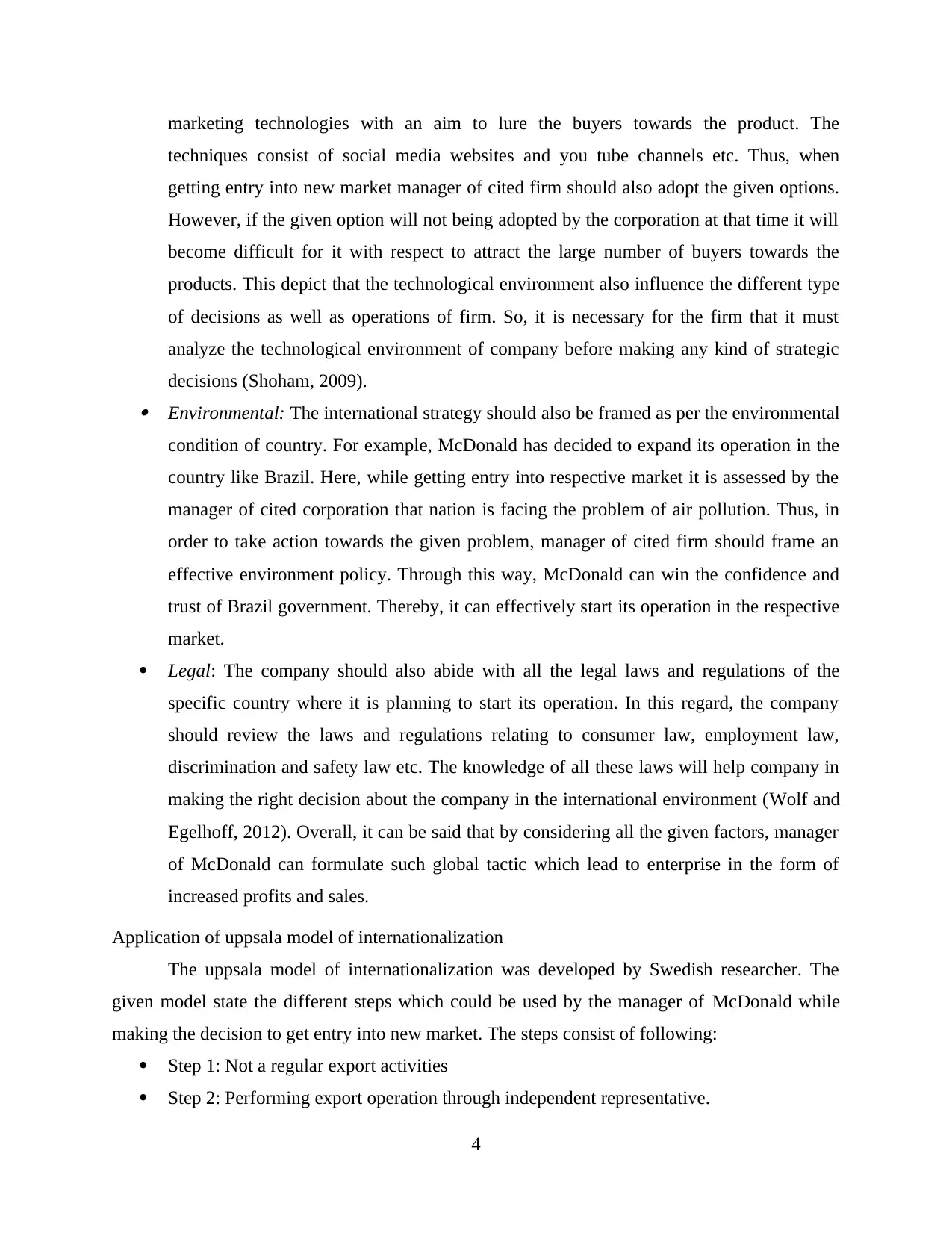
marketing technologies with an aim to lure the buyers towards the product. The
techniques consist of social media websites and you tube channels etc. Thus, when
getting entry into new market manager of cited firm should also adopt the given options.
However, if the given option will not being adopted by the corporation at that time it will
become difficult for it with respect to attract the large number of buyers towards the
products. This depict that the technological environment also influence the different type
of decisions as well as operations of firm. So, it is necessary for the firm that it must
analyze the technological environment of company before making any kind of strategic
decisions (Shoham, 2009). Environmental: The international strategy should also be framed as per the environmental
condition of country. For example, McDonald has decided to expand its operation in the
country like Brazil. Here, while getting entry into respective market it is assessed by the
manager of cited corporation that nation is facing the problem of air pollution. Thus, in
order to take action towards the given problem, manager of cited firm should frame an
effective environment policy. Through this way, McDonald can win the confidence and
trust of Brazil government. Thereby, it can effectively start its operation in the respective
market.
Legal: The company should also abide with all the legal laws and regulations of the
specific country where it is planning to start its operation. In this regard, the company
should review the laws and regulations relating to consumer law, employment law,
discrimination and safety law etc. The knowledge of all these laws will help company in
making the right decision about the company in the international environment (Wolf and
Egelhoff, 2012). Overall, it can be said that by considering all the given factors, manager
of McDonald can formulate such global tactic which lead to enterprise in the form of
increased profits and sales.
Application of uppsala model of internationalization
The uppsala model of internationalization was developed by Swedish researcher. The
given model state the different steps which could be used by the manager of McDonald while
making the decision to get entry into new market. The steps consist of following:
Step 1: Not a regular export activities
Step 2: Performing export operation through independent representative.
4
techniques consist of social media websites and you tube channels etc. Thus, when
getting entry into new market manager of cited firm should also adopt the given options.
However, if the given option will not being adopted by the corporation at that time it will
become difficult for it with respect to attract the large number of buyers towards the
products. This depict that the technological environment also influence the different type
of decisions as well as operations of firm. So, it is necessary for the firm that it must
analyze the technological environment of company before making any kind of strategic
decisions (Shoham, 2009). Environmental: The international strategy should also be framed as per the environmental
condition of country. For example, McDonald has decided to expand its operation in the
country like Brazil. Here, while getting entry into respective market it is assessed by the
manager of cited corporation that nation is facing the problem of air pollution. Thus, in
order to take action towards the given problem, manager of cited firm should frame an
effective environment policy. Through this way, McDonald can win the confidence and
trust of Brazil government. Thereby, it can effectively start its operation in the respective
market.
Legal: The company should also abide with all the legal laws and regulations of the
specific country where it is planning to start its operation. In this regard, the company
should review the laws and regulations relating to consumer law, employment law,
discrimination and safety law etc. The knowledge of all these laws will help company in
making the right decision about the company in the international environment (Wolf and
Egelhoff, 2012). Overall, it can be said that by considering all the given factors, manager
of McDonald can formulate such global tactic which lead to enterprise in the form of
increased profits and sales.
Application of uppsala model of internationalization
The uppsala model of internationalization was developed by Swedish researcher. The
given model state the different steps which could be used by the manager of McDonald while
making the decision to get entry into new market. The steps consist of following:
Step 1: Not a regular export activities
Step 2: Performing export operation through independent representative.
4
Paraphrase This Document
Need a fresh take? Get an instant paraphrase of this document with our AI Paraphraser
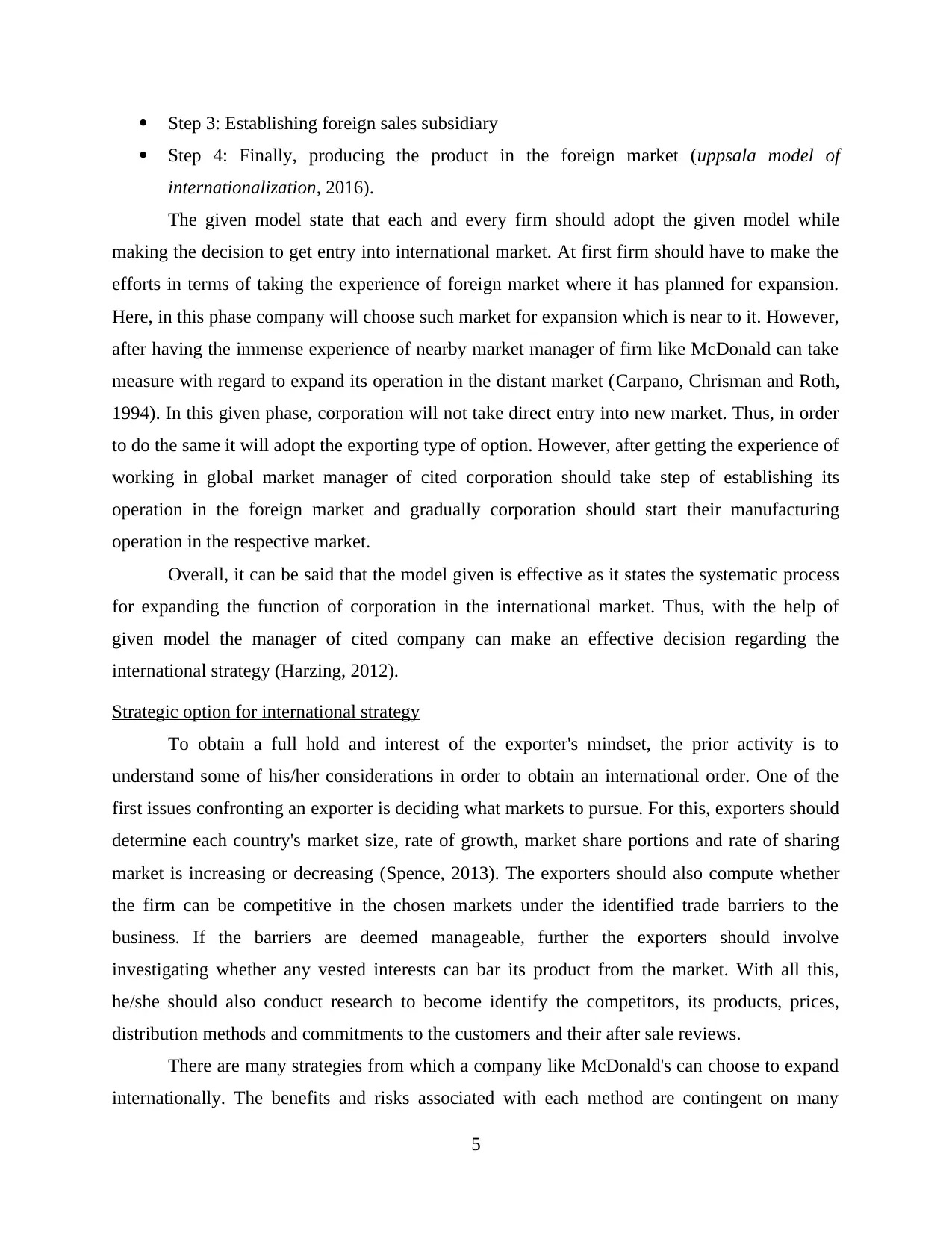
Step 3: Establishing foreign sales subsidiary
Step 4: Finally, producing the product in the foreign market (uppsala model of
internationalization, 2016).
The given model state that each and every firm should adopt the given model while
making the decision to get entry into international market. At first firm should have to make the
efforts in terms of taking the experience of foreign market where it has planned for expansion.
Here, in this phase company will choose such market for expansion which is near to it. However,
after having the immense experience of nearby market manager of firm like McDonald can take
measure with regard to expand its operation in the distant market (Carpano, Chrisman and Roth,
1994). In this given phase, corporation will not take direct entry into new market. Thus, in order
to do the same it will adopt the exporting type of option. However, after getting the experience of
working in global market manager of cited corporation should take step of establishing its
operation in the foreign market and gradually corporation should start their manufacturing
operation in the respective market.
Overall, it can be said that the model given is effective as it states the systematic process
for expanding the function of corporation in the international market. Thus, with the help of
given model the manager of cited company can make an effective decision regarding the
international strategy (Harzing, 2012).
Strategic option for international strategy
To obtain a full hold and interest of the exporter's mindset, the prior activity is to
understand some of his/her considerations in order to obtain an international order. One of the
first issues confronting an exporter is deciding what markets to pursue. For this, exporters should
determine each country's market size, rate of growth, market share portions and rate of sharing
market is increasing or decreasing (Spence, 2013). The exporters should also compute whether
the firm can be competitive in the chosen markets under the identified trade barriers to the
business. If the barriers are deemed manageable, further the exporters should involve
investigating whether any vested interests can bar its product from the market. With all this,
he/she should also conduct research to become identify the competitors, its products, prices,
distribution methods and commitments to the customers and their after sale reviews.
There are many strategies from which a company like McDonald's can choose to expand
internationally. The benefits and risks associated with each method are contingent on many
5
Step 4: Finally, producing the product in the foreign market (uppsala model of
internationalization, 2016).
The given model state that each and every firm should adopt the given model while
making the decision to get entry into international market. At first firm should have to make the
efforts in terms of taking the experience of foreign market where it has planned for expansion.
Here, in this phase company will choose such market for expansion which is near to it. However,
after having the immense experience of nearby market manager of firm like McDonald can take
measure with regard to expand its operation in the distant market (Carpano, Chrisman and Roth,
1994). In this given phase, corporation will not take direct entry into new market. Thus, in order
to do the same it will adopt the exporting type of option. However, after getting the experience of
working in global market manager of cited corporation should take step of establishing its
operation in the foreign market and gradually corporation should start their manufacturing
operation in the respective market.
Overall, it can be said that the model given is effective as it states the systematic process
for expanding the function of corporation in the international market. Thus, with the help of
given model the manager of cited company can make an effective decision regarding the
international strategy (Harzing, 2012).
Strategic option for international strategy
To obtain a full hold and interest of the exporter's mindset, the prior activity is to
understand some of his/her considerations in order to obtain an international order. One of the
first issues confronting an exporter is deciding what markets to pursue. For this, exporters should
determine each country's market size, rate of growth, market share portions and rate of sharing
market is increasing or decreasing (Spence, 2013). The exporters should also compute whether
the firm can be competitive in the chosen markets under the identified trade barriers to the
business. If the barriers are deemed manageable, further the exporters should involve
investigating whether any vested interests can bar its product from the market. With all this,
he/she should also conduct research to become identify the competitors, its products, prices,
distribution methods and commitments to the customers and their after sale reviews.
There are many strategies from which a company like McDonald's can choose to expand
internationally. The benefits and risks associated with each method are contingent on many
5
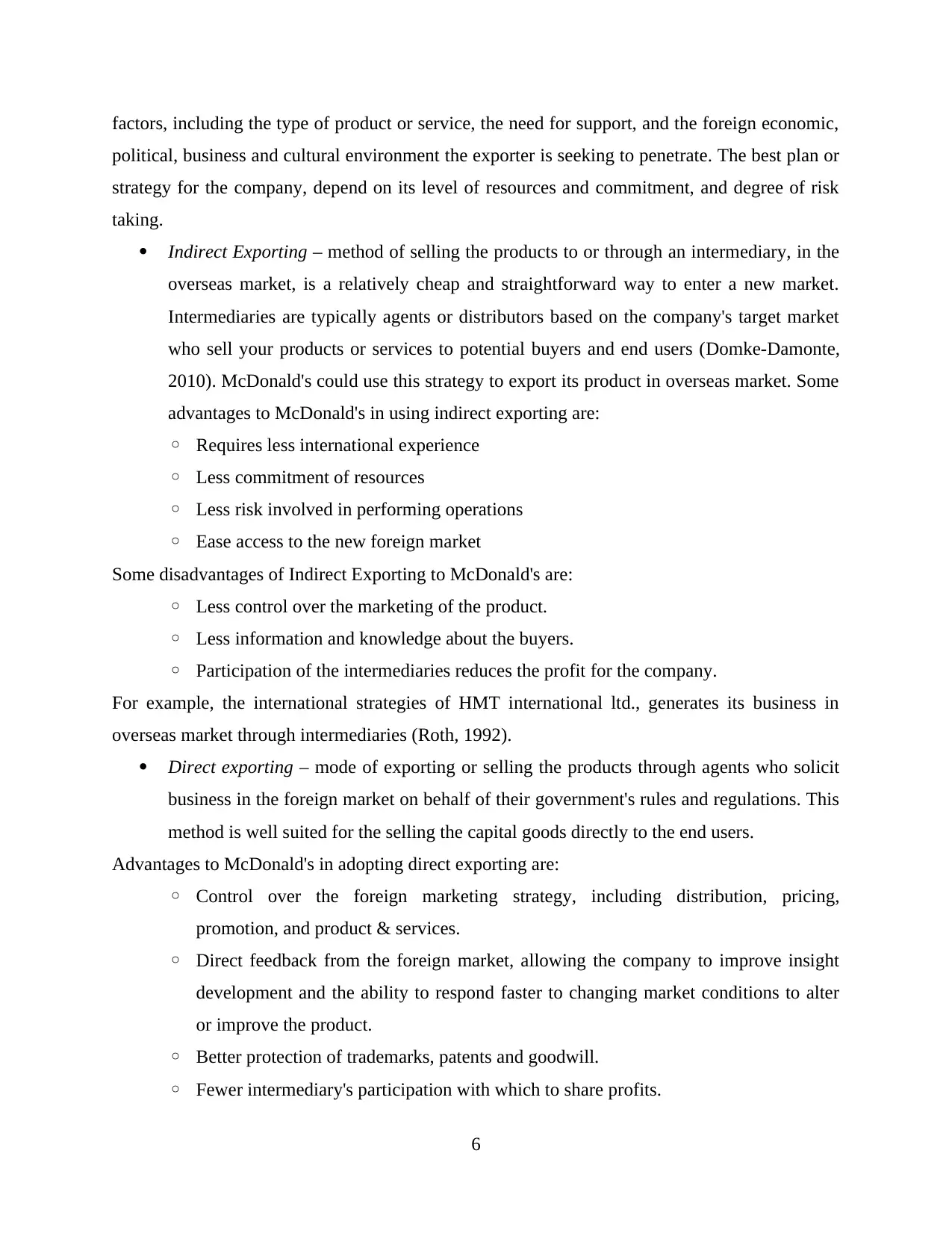
factors, including the type of product or service, the need for support, and the foreign economic,
political, business and cultural environment the exporter is seeking to penetrate. The best plan or
strategy for the company, depend on its level of resources and commitment, and degree of risk
taking.
Indirect Exporting – method of selling the products to or through an intermediary, in the
overseas market, is a relatively cheap and straightforward way to enter a new market.
Intermediaries are typically agents or distributors based on the company's target market
who sell your products or services to potential buyers and end users (Domke-Damonte,
2010). McDonald's could use this strategy to export its product in overseas market. Some
advantages to McDonald's in using indirect exporting are:
◦ Requires less international experience
◦ Less commitment of resources
◦ Less risk involved in performing operations
◦ Ease access to the new foreign market
Some disadvantages of Indirect Exporting to McDonald's are:
◦ Less control over the marketing of the product.
◦ Less information and knowledge about the buyers.
◦ Participation of the intermediaries reduces the profit for the company.
For example, the international strategies of HMT international ltd., generates its business in
overseas market through intermediaries (Roth, 1992).
Direct exporting – mode of exporting or selling the products through agents who solicit
business in the foreign market on behalf of their government's rules and regulations. This
method is well suited for the selling the capital goods directly to the end users.
Advantages to McDonald's in adopting direct exporting are:
◦ Control over the foreign marketing strategy, including distribution, pricing,
promotion, and product & services.
◦ Direct feedback from the foreign market, allowing the company to improve insight
development and the ability to respond faster to changing market conditions to alter
or improve the product.
◦ Better protection of trademarks, patents and goodwill.
◦ Fewer intermediary's participation with which to share profits.
6
political, business and cultural environment the exporter is seeking to penetrate. The best plan or
strategy for the company, depend on its level of resources and commitment, and degree of risk
taking.
Indirect Exporting – method of selling the products to or through an intermediary, in the
overseas market, is a relatively cheap and straightforward way to enter a new market.
Intermediaries are typically agents or distributors based on the company's target market
who sell your products or services to potential buyers and end users (Domke-Damonte,
2010). McDonald's could use this strategy to export its product in overseas market. Some
advantages to McDonald's in using indirect exporting are:
◦ Requires less international experience
◦ Less commitment of resources
◦ Less risk involved in performing operations
◦ Ease access to the new foreign market
Some disadvantages of Indirect Exporting to McDonald's are:
◦ Less control over the marketing of the product.
◦ Less information and knowledge about the buyers.
◦ Participation of the intermediaries reduces the profit for the company.
For example, the international strategies of HMT international ltd., generates its business in
overseas market through intermediaries (Roth, 1992).
Direct exporting – mode of exporting or selling the products through agents who solicit
business in the foreign market on behalf of their government's rules and regulations. This
method is well suited for the selling the capital goods directly to the end users.
Advantages to McDonald's in adopting direct exporting are:
◦ Control over the foreign marketing strategy, including distribution, pricing,
promotion, and product & services.
◦ Direct feedback from the foreign market, allowing the company to improve insight
development and the ability to respond faster to changing market conditions to alter
or improve the product.
◦ Better protection of trademarks, patents and goodwill.
◦ Fewer intermediary's participation with which to share profits.
6
⊘ This is a preview!⊘
Do you want full access?
Subscribe today to unlock all pages.

Trusted by 1+ million students worldwide
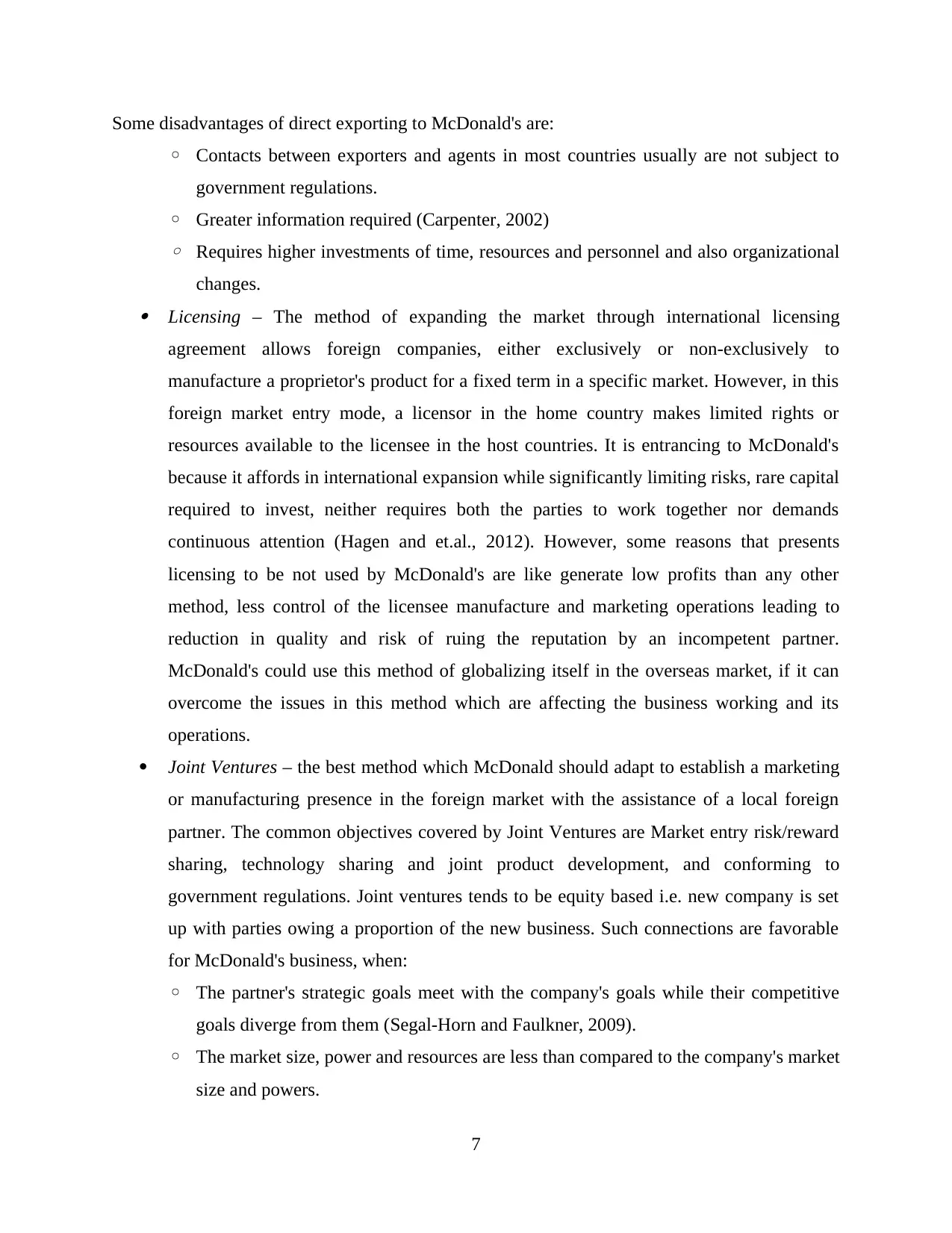
Some disadvantages of direct exporting to McDonald's are:
◦ Contacts between exporters and agents in most countries usually are not subject to
government regulations.
◦ Greater information required (Carpenter, 2002)
◦ Requires higher investments of time, resources and personnel and also organizational
changes. Licensing – The method of expanding the market through international licensing
agreement allows foreign companies, either exclusively or non-exclusively to
manufacture a proprietor's product for a fixed term in a specific market. However, in this
foreign market entry mode, a licensor in the home country makes limited rights or
resources available to the licensee in the host countries. It is entrancing to McDonald's
because it affords in international expansion while significantly limiting risks, rare capital
required to invest, neither requires both the parties to work together nor demands
continuous attention (Hagen and et.al., 2012). However, some reasons that presents
licensing to be not used by McDonald's are like generate low profits than any other
method, less control of the licensee manufacture and marketing operations leading to
reduction in quality and risk of ruing the reputation by an incompetent partner.
McDonald's could use this method of globalizing itself in the overseas market, if it can
overcome the issues in this method which are affecting the business working and its
operations.
Joint Ventures – the best method which McDonald should adapt to establish a marketing
or manufacturing presence in the foreign market with the assistance of a local foreign
partner. The common objectives covered by Joint Ventures are Market entry risk/reward
sharing, technology sharing and joint product development, and conforming to
government regulations. Joint ventures tends to be equity based i.e. new company is set
up with parties owing a proportion of the new business. Such connections are favorable
for McDonald's business, when:
◦ The partner's strategic goals meet with the company's goals while their competitive
goals diverge from them (Segal-Horn and Faulkner, 2009).
◦ The market size, power and resources are less than compared to the company's market
size and powers.
7
◦ Contacts between exporters and agents in most countries usually are not subject to
government regulations.
◦ Greater information required (Carpenter, 2002)
◦ Requires higher investments of time, resources and personnel and also organizational
changes. Licensing – The method of expanding the market through international licensing
agreement allows foreign companies, either exclusively or non-exclusively to
manufacture a proprietor's product for a fixed term in a specific market. However, in this
foreign market entry mode, a licensor in the home country makes limited rights or
resources available to the licensee in the host countries. It is entrancing to McDonald's
because it affords in international expansion while significantly limiting risks, rare capital
required to invest, neither requires both the parties to work together nor demands
continuous attention (Hagen and et.al., 2012). However, some reasons that presents
licensing to be not used by McDonald's are like generate low profits than any other
method, less control of the licensee manufacture and marketing operations leading to
reduction in quality and risk of ruing the reputation by an incompetent partner.
McDonald's could use this method of globalizing itself in the overseas market, if it can
overcome the issues in this method which are affecting the business working and its
operations.
Joint Ventures – the best method which McDonald should adapt to establish a marketing
or manufacturing presence in the foreign market with the assistance of a local foreign
partner. The common objectives covered by Joint Ventures are Market entry risk/reward
sharing, technology sharing and joint product development, and conforming to
government regulations. Joint ventures tends to be equity based i.e. new company is set
up with parties owing a proportion of the new business. Such connections are favorable
for McDonald's business, when:
◦ The partner's strategic goals meet with the company's goals while their competitive
goals diverge from them (Segal-Horn and Faulkner, 2009).
◦ The market size, power and resources are less than compared to the company's market
size and powers.
7
Paraphrase This Document
Need a fresh take? Get an instant paraphrase of this document with our AI Paraphraser
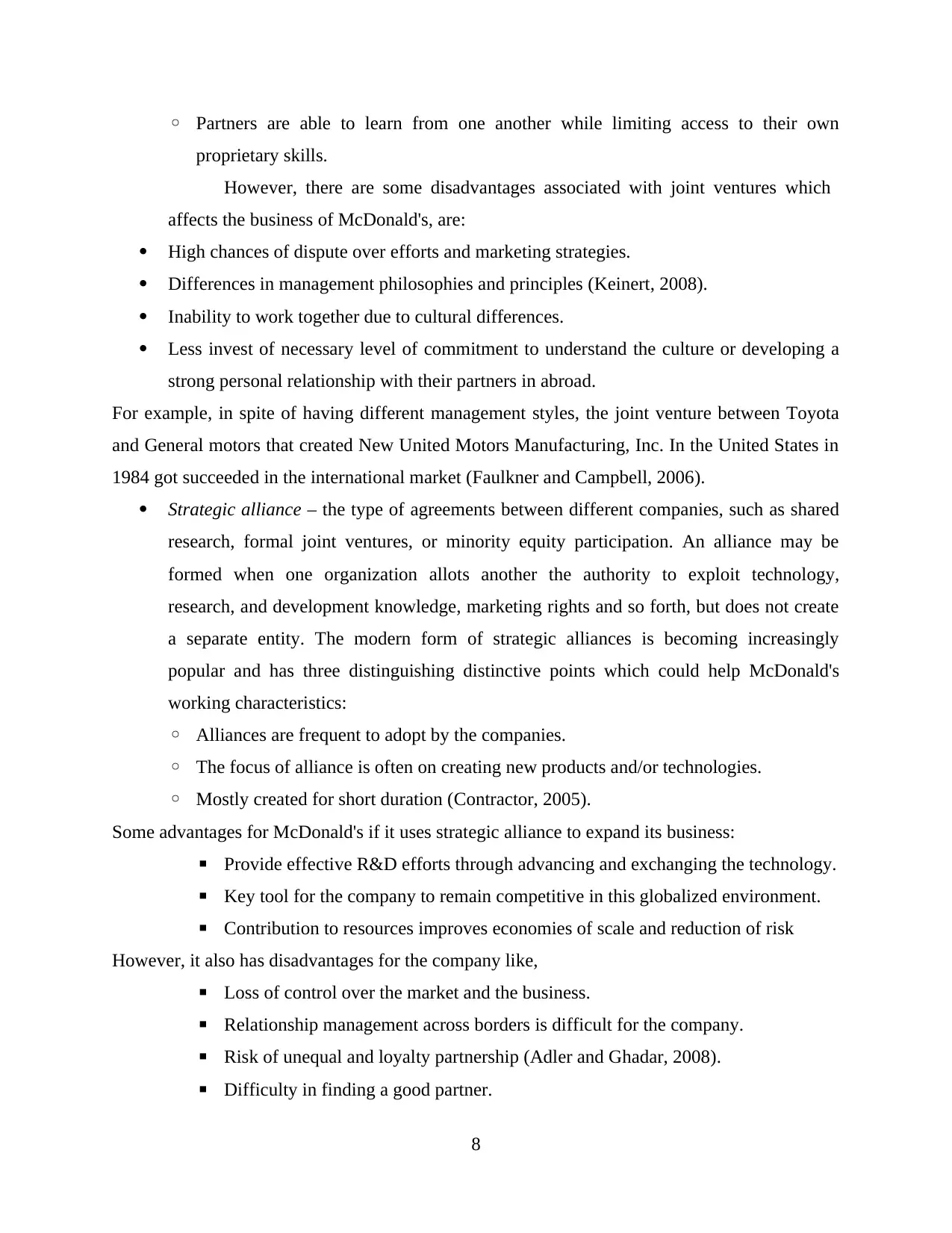
◦ Partners are able to learn from one another while limiting access to their own
proprietary skills.
However, there are some disadvantages associated with joint ventures which
affects the business of McDonald's, are:
High chances of dispute over efforts and marketing strategies.
Differences in management philosophies and principles (Keinert, 2008).
Inability to work together due to cultural differences.
Less invest of necessary level of commitment to understand the culture or developing a
strong personal relationship with their partners in abroad.
For example, in spite of having different management styles, the joint venture between Toyota
and General motors that created New United Motors Manufacturing, Inc. In the United States in
1984 got succeeded in the international market (Faulkner and Campbell, 2006).
Strategic alliance – the type of agreements between different companies, such as shared
research, formal joint ventures, or minority equity participation. An alliance may be
formed when one organization allots another the authority to exploit technology,
research, and development knowledge, marketing rights and so forth, but does not create
a separate entity. The modern form of strategic alliances is becoming increasingly
popular and has three distinguishing distinctive points which could help McDonald's
working characteristics:
◦ Alliances are frequent to adopt by the companies.
◦ The focus of alliance is often on creating new products and/or technologies.
◦ Mostly created for short duration (Contractor, 2005).
Some advantages for McDonald's if it uses strategic alliance to expand its business:
▪ Provide effective R&D efforts through advancing and exchanging the technology.
▪ Key tool for the company to remain competitive in this globalized environment.
▪ Contribution to resources improves economies of scale and reduction of risk
However, it also has disadvantages for the company like,
▪ Loss of control over the market and the business.
▪ Relationship management across borders is difficult for the company.
▪ Risk of unequal and loyalty partnership (Adler and Ghadar, 2008).
▪ Difficulty in finding a good partner.
8
proprietary skills.
However, there are some disadvantages associated with joint ventures which
affects the business of McDonald's, are:
High chances of dispute over efforts and marketing strategies.
Differences in management philosophies and principles (Keinert, 2008).
Inability to work together due to cultural differences.
Less invest of necessary level of commitment to understand the culture or developing a
strong personal relationship with their partners in abroad.
For example, in spite of having different management styles, the joint venture between Toyota
and General motors that created New United Motors Manufacturing, Inc. In the United States in
1984 got succeeded in the international market (Faulkner and Campbell, 2006).
Strategic alliance – the type of agreements between different companies, such as shared
research, formal joint ventures, or minority equity participation. An alliance may be
formed when one organization allots another the authority to exploit technology,
research, and development knowledge, marketing rights and so forth, but does not create
a separate entity. The modern form of strategic alliances is becoming increasingly
popular and has three distinguishing distinctive points which could help McDonald's
working characteristics:
◦ Alliances are frequent to adopt by the companies.
◦ The focus of alliance is often on creating new products and/or technologies.
◦ Mostly created for short duration (Contractor, 2005).
Some advantages for McDonald's if it uses strategic alliance to expand its business:
▪ Provide effective R&D efforts through advancing and exchanging the technology.
▪ Key tool for the company to remain competitive in this globalized environment.
▪ Contribution to resources improves economies of scale and reduction of risk
However, it also has disadvantages for the company like,
▪ Loss of control over the market and the business.
▪ Relationship management across borders is difficult for the company.
▪ Risk of unequal and loyalty partnership (Adler and Ghadar, 2008).
▪ Difficulty in finding a good partner.
8
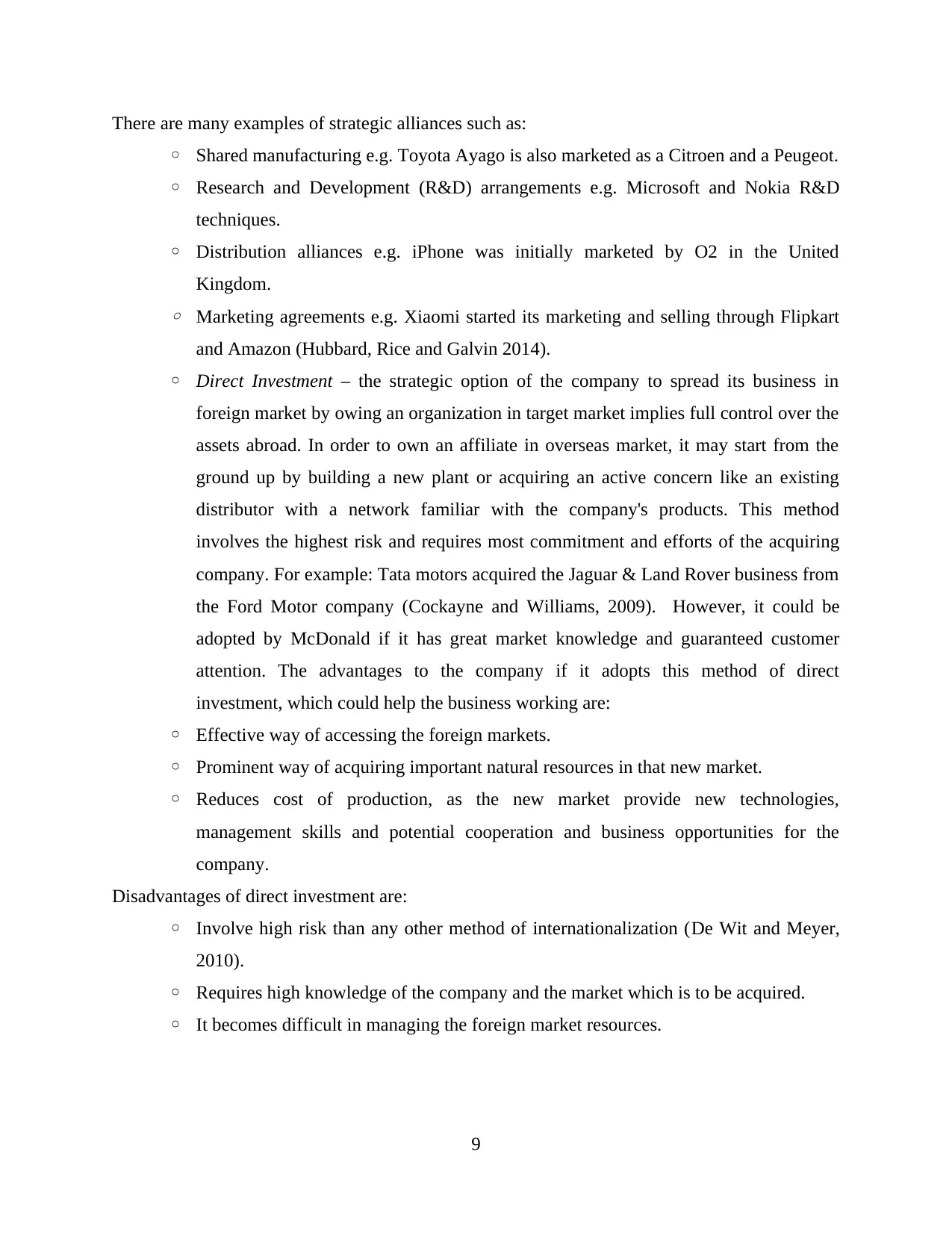
There are many examples of strategic alliances such as:
◦ Shared manufacturing e.g. Toyota Ayago is also marketed as a Citroen and a Peugeot.
◦ Research and Development (R&D) arrangements e.g. Microsoft and Nokia R&D
techniques.
◦ Distribution alliances e.g. iPhone was initially marketed by O2 in the United
Kingdom.
◦ Marketing agreements e.g. Xiaomi started its marketing and selling through Flipkart
and Amazon (Hubbard, Rice and Galvin 2014).
◦ Direct Investment – the strategic option of the company to spread its business in
foreign market by owing an organization in target market implies full control over the
assets abroad. In order to own an affiliate in overseas market, it may start from the
ground up by building a new plant or acquiring an active concern like an existing
distributor with a network familiar with the company's products. This method
involves the highest risk and requires most commitment and efforts of the acquiring
company. For example: Tata motors acquired the Jaguar & Land Rover business from
the Ford Motor company (Cockayne and Williams, 2009). However, it could be
adopted by McDonald if it has great market knowledge and guaranteed customer
attention. The advantages to the company if it adopts this method of direct
investment, which could help the business working are:
◦ Effective way of accessing the foreign markets.
◦ Prominent way of acquiring important natural resources in that new market.
◦ Reduces cost of production, as the new market provide new technologies,
management skills and potential cooperation and business opportunities for the
company.
Disadvantages of direct investment are:
◦ Involve high risk than any other method of internationalization (De Wit and Meyer,
2010).
◦ Requires high knowledge of the company and the market which is to be acquired.
◦ It becomes difficult in managing the foreign market resources.
9
◦ Shared manufacturing e.g. Toyota Ayago is also marketed as a Citroen and a Peugeot.
◦ Research and Development (R&D) arrangements e.g. Microsoft and Nokia R&D
techniques.
◦ Distribution alliances e.g. iPhone was initially marketed by O2 in the United
Kingdom.
◦ Marketing agreements e.g. Xiaomi started its marketing and selling through Flipkart
and Amazon (Hubbard, Rice and Galvin 2014).
◦ Direct Investment – the strategic option of the company to spread its business in
foreign market by owing an organization in target market implies full control over the
assets abroad. In order to own an affiliate in overseas market, it may start from the
ground up by building a new plant or acquiring an active concern like an existing
distributor with a network familiar with the company's products. This method
involves the highest risk and requires most commitment and efforts of the acquiring
company. For example: Tata motors acquired the Jaguar & Land Rover business from
the Ford Motor company (Cockayne and Williams, 2009). However, it could be
adopted by McDonald if it has great market knowledge and guaranteed customer
attention. The advantages to the company if it adopts this method of direct
investment, which could help the business working are:
◦ Effective way of accessing the foreign markets.
◦ Prominent way of acquiring important natural resources in that new market.
◦ Reduces cost of production, as the new market provide new technologies,
management skills and potential cooperation and business opportunities for the
company.
Disadvantages of direct investment are:
◦ Involve high risk than any other method of internationalization (De Wit and Meyer,
2010).
◦ Requires high knowledge of the company and the market which is to be acquired.
◦ It becomes difficult in managing the foreign market resources.
9
⊘ This is a preview!⊘
Do you want full access?
Subscribe today to unlock all pages.

Trusted by 1+ million students worldwide
1 out of 18
Related Documents
Your All-in-One AI-Powered Toolkit for Academic Success.
+13062052269
info@desklib.com
Available 24*7 on WhatsApp / Email
![[object Object]](/_next/static/media/star-bottom.7253800d.svg)
Unlock your academic potential
Copyright © 2020–2025 A2Z Services. All Rights Reserved. Developed and managed by ZUCOL.





